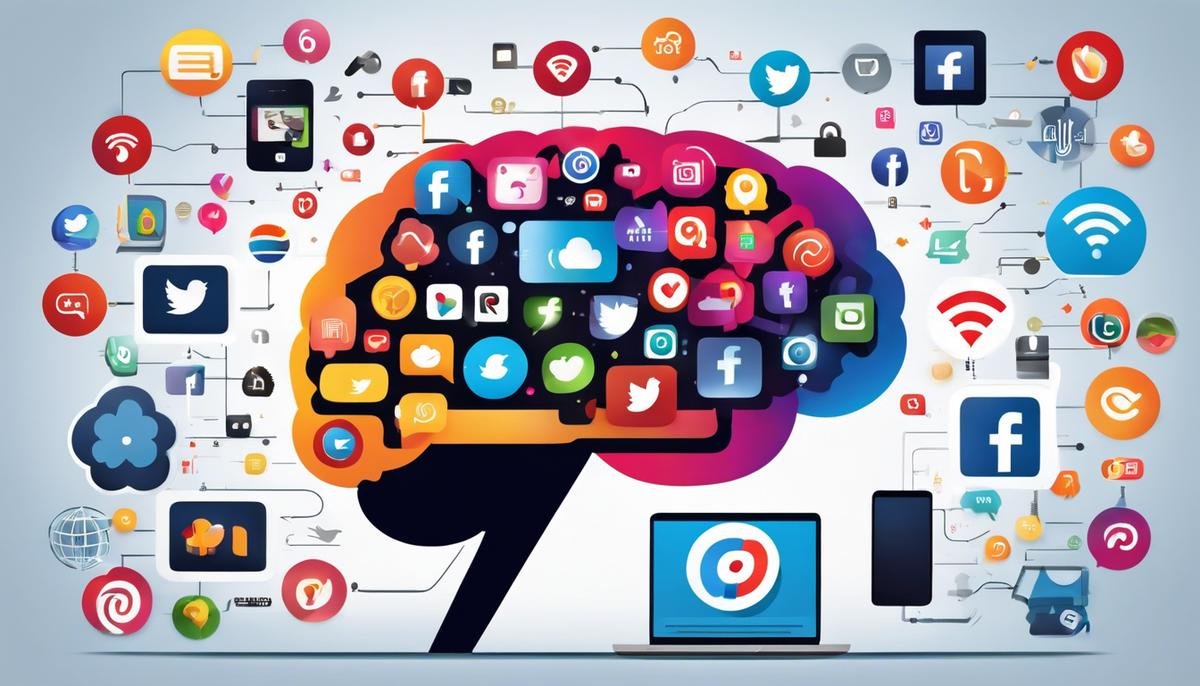The rise of artificial intelligence has reset the boundaries of what’s possible within the realm of social media, steering us into a digitally nuanced epoch where human interaction intertwines with sophisticated machine learning. As AI technologies become increasingly prevalent, they reshape our online ecosystems, promising to enhance how we connect, convey, and consume digital content. This essay embarks on a comprehensive journey through the evolving landscape of AI in social media, from its nascent stages of content recommendations to the complex web of predictive analytics, chatbots, and content governance that now underpins the user experience. By dissecting the multifaceted role of AI, we’ll unravel its profound impact on digital interactions and marketing, while navigating the intricacies of user empowerment versus the entanglements of digital privacy.
The Evolution of AI in Social Media
Artificial Intelligence: The New Social Media Game-Changer
As a tech enthusiast, it’s impossible to ignore the seismic shifts occurring in social media, and much of that tremor comes from the integration of artificial intelligence (AI). AI is not just a buzzword; it is the engine driving social media’s evolution, transforming how users interact with each other and with content.
Content Personalization: Tailored Experiences for Each UserGone are the days of generic social media feeds. AI studies individual preferences and behaviors, curating content that hits the mark for each user. It keeps tabs on what people like, share, and spend time on, ensuring they get more of what hooks them.
Chatbots: Conversations Without Human FatigueEngaging with customers on social media used to mean a human touch, but AI chatbots now conduct these interactions seamlessly. Whether you need customer service or general information, these bots provide immediate, round-the-clock responses without breaking a sweat.
Targeted Advertising: Pinpoint Accuracy in MarketingAI has revolutionized advertising on social media. It’s not just about reaching an audience; it’s about reaching the right audience. With AI, ads are so tailored that they reach potential customers who are most likely to make a purchase, thus boosting return on investment.
Content Moderation: A Cleaner, Safer Online CommunityThe dark side of social media includes spam, offensive content, and fake news. AI steps in as the watchful guardian, moderating content at a speed and scale no human team could ever match. It quickly identifies and removes harmful content, making platforms safer for everyone.
Video and Image Recognition: Unlocking New Dimensions in ContentAI doesn’t just understand text; it’s now adept at analyzing images and videos. By recognizing and interpreting visual content, AI enables new search capabilities and creates richer, more interactive experiences for users.
Predictive Analytics: Mapping the Future of User EngagementWith AI’s ability to analyze vast amounts of data, social media platforms can predict trends and user behavior. This foresight allows platforms and content creators to stay ahead of the curve, crafting content that hits the mark before a trend even peaks.
In conclusion, AI is not just changing the social media landscape, it’s completely overhauling it. As these platforms grow smarter and more intuitive, users will find that their online social experiences are vastly more engaging, personal, and relevant than ever before. Welcome to the AI-powered future of social media—it’s here to stay.

Benefits and Pitfalls of AI in Social Networks
Title: The Double-Edged Sword of AI in Social Platforms
In the realm of social networks, the integration of Artificial Intelligence (AI) is transforming the way we connect and interact online. This technology isn’t just a fancy addition; it’s reshaping the core functionalities of our social experiences. However, like any technology, AI comes with its own set of advantages and disadvantages that deserve a scrutinizing look. Let’s dive in.
Pros:
- Efficient Customer Service: AI-driven systems on social platforms can address user queries almost instantly, thanks to sophisticated algorithms that understand and respond to a range of issues. This means no more waiting on hold for a customer service rep – AI has got you covered.
- Enhanced User Experience: By understanding user preferences and behaviors, AI can streamline newsfeeds and notifications. This creates a more enjoyable and tailored experience for users, who receive content that is most relevant to them.
- Fraud Detection: AI is a watchdog for suspicious activities. It can identify potentially fraudulent accounts or transactions at lightning speed, ensuring users a safer social environment. This is crucial, as swift actions in these scenarios often prevent harm.
- Real-time Language Translation: Social networks are global, and language barriers can be a hurdle. AI-powered translation tears down these walls, offering real-time language translation to help users from different regions connect effortlessly.
Cons:
- Privacy Concerns: The data analysis that fuels AI can be intrusive. Users often worry about what personal information is harvested and how it’s used. Transparency and consent are critical issues that platforms must address to maintain trust.
- Potential Job Displacement: AI’s efficiency can sometimes be a double-edged sword, potentially replacing human jobs, particularly in customer service and content moderation. The human touch is valuable, and finding a balance is key.
- Bias and Errors: AI is only as unbiased as the data it’s fed. If the underlying data contains biases, the AI will too, leading to unfair or inaccurate outputs. Plus, AI isn’t foolproof; it can make errors, sometimes with significant consequences.
- Dependency Risks: Heavy reliance on AI can lead to a dependency that might stifle human creativity and decision-making. Sometimes, the answer isn’t more technology, but a mix of technology and human intuition.
The integration of AI into social networks is nothing short of a revolution with its complex tapestry of benefits and challenges. As enthusiastic adopters of this new wave of technology, it’s our job to stay informed, adapt where necessary, and anticipate the next evolution of digital social interaction. With a critical yet open-minded approach, the future of AI in social networks will undoubtedly be fascinating.

AI-Driven Social Media Marketing
AI Transforming Social Media Marketing: Beyond the Basics
In the realm of social media marketing, Artificial Intelligence (AI) isn’t just transforming things; it’s completely rewriting the rulebook. This rapid evolution is powered by AI’s ability to analyze vast amounts of data, spot trends, and turn these insights into actionable strategies.
One frontier where AI is making an impact is Influencer Marketing. Algorithmically identifying key influencers who resonate with a brand’s target demographic has been a game-changer. Influence analysis tools powered by AI help brands cut through the noise by highlighting individuals with genuine reach and engagement – not just vanity metrics. By partnering with the right influencers, companies can create organic, trusted advocacy that speaks directly to potential customers.
Additionally, AI is shaping Social Listening – the process of monitoring digital conversations to understand what customers are saying about a brand or an industry online. Using AI-driven tools, marketers can now get real-time alerts about brand mentions, sentiment, and emerging trends, enabling them to respond proactively and stay one step ahead of the curve.
The previously untapped area of Content Curation is another where AI is making its mark. Armed with machine learning, algorithms can now suggest and compile content that will resonate best with an audience. This is done by learning from past user interactions and continually refining content recommendations, making sure that each user’s feed is more engaging and relevant.
Let’s not overlook AI’s role in Collaborative Filtering, which is similar to personalization but operates on a broader scale. This technique is used heavily by social platforms to recommend connections, groups, and even products, based on the actions of similar users. Collaborative filtering ensures users stay engaged by connecting them with content, communities, and products they’re more likely to enjoy, based on the wisdom of the crowd.
Lastly, it’s essential to recognize the adaptability of AI in managing ever-changing social media algorithms. The digital terrain is in continual flux, but AI-driven tools can detect changes in platform algorithms and modify strategies accordingly. This ensures that social media campaigns remain effective, enhancing reach and engagement even as underlying technologies shift.
As social media grows more integrated with AI, these technologies are setting new standards for cutting-edge marketing strategies. The tech-savvy marketer isn’t just watching these changes; they’re embracing them to stay ahead, continuously innovating in their quest to connect with audiences in the most impactful ways possible.

Ethics and Regulation of AI in Social Media
Navigating the Ethical Minefield of AI in Social Media
Artificial Intelligence (AI) is revolutionizing social media platforms at breakneck speed, and with it comes a host of ethical implications and regulatory challenges that must not be overlooked.
Ethical Implications:
- Ownership and Control: AI algorithms are designed by humans, which inevitably raises questions about who owns and controls these technologies. When AI curates content or builds profiles, the data it uses can encroach upon personal ownership rights. Ownership of digital identities becomes murky when AI is involved, leading to significant ethical conundrums.
- Manipulation: AI’s ability to analyze and predict user behavior can lead to concerns about manipulation. This becomes especially complicated when considering political campaigns or ideological movements that may use AI to influence public opinion, raising questions about the moral responsibilities of tech companies in these scenarios.
- Transparency: The “black box” nature of AI algorithms means that users often have no idea how or why they are being served specific content. This lack of transparency can worsen the ethical situation, leading to mistrust and concerns over hidden agendas.
- Mental Health: With AI’s power to keep users hooked through addictive content loops, there’s a growing ethical debate on the impact of these algorithms on users’ mental health. The relentless pursuit of engagement risks prioritizing platform stickiness over user well-being.
Regulatory Challenges:
- Standardization: Regulation of AI in social media is like aiming at a moving target; technology evolves faster than laws can adapt. The absence of standardized global regulations for AI means that multinational social media companies often have to navigate a patchwork of regional laws, leading to inconsistent experiences and protections for users worldwide.
- Enforcement: Even when regulations are in place, enforcement is a major hurdle. Monitoring the fast-paced and complex nature of AI-driven activities is overwhelming for regulatory bodies, which may lack the resources or technology to keep up.
- Global Cooperation: AI’s influence crosses borders, presenting a need for international cooperation in regulation. However, geopolitical interests and varying cultural norms make a united approach difficult to achieve.
- Accountability: When AI systems make decisions, assigning accountability for those decisions becomes problematic. The ability of AI to analyze large data sets without human oversight complicates the process of holding individuals or companies responsible for outcomes, thwarting regulatory efforts.
Conclusion:
As AI continues to embed itself in social media, both ethical implications and regulatory challenges demand our attention. It’s essential for technology enthusiasts to not only embrace AI’s transformative potential but also advocate for responsible and fair frameworks that safeguard users and the integrity of our digital spaces. The tech-savvy, forward-thinkers will continue to play a crucial role in discussing and shaping the future where AI works for, not against, the fabric of society.

The Future of AI-Driven Social Platforms
When peering into the crystal ball of social media’s future, there’s no doubt that Artificial Intelligence (AI) will play an increasingly significant role. Beyond the things already discussed, such as personalization, moderation, and improved services, several key areas will shape the AI landscape within the social media realm.
First off, let’s talk about social media platforms as trend predictors. AI is getting better at understanding and anticipating what’s going to be hot next. Say goodbye to being late to the party; AI will enable platforms to stay ahead of trends, suggesting content that keeps users engaged and creators creating.
Then there’s the rise of deepfakes and synthetic media. AI can now generate realistic videos and images that are hard to distinguish from the real deal. While this can be fun and entertaining, it also poses challenges for authenticity and trust. Social media will need AI-driven tools to detect and manage synthetic content, ensuring users can trust what they see and hear.
AI will further refine the user’s control over social media experiences. Right now, we already tweak our profiles and choose who to follow, but AI will give us even more power to craft our social media environments, maybe even by suggesting whom to unfollow or showing less from over-posted topics.
As social media platforms continue to evolve, AI will be essential for compliance with varying global regulations. This means automated systems that can adapt to legal changes and enforce rules fairly and consistently across all regions.
Last but not least, there will likely be a new category of social media professionals with AI expertise. These jobs will require a deep understanding of AI and how it intertwiles with human behavior online. These experts will help social media companies make ethical decisions about how AI is used and will be key players in shaping the responsible development of this technology.
With AI’s evolution, the future of social media looks promising but also complex. Advances will need to tread carefully, balancing innovation with ethical considerations, to ensure that AI remains a valuable tool for connecting the world.

As the digital horizon continues to expand, propelled by the relentless advancement of AI, the very fabric of social media evolves with it. The journey we’ve embarked upon reveals a future where artificial intelligence is not just a tool, but a pivotal architect in the narrative of social connectivity. This exploration through ethical quandaries, revolutionary marketing strategies, and the potential for future innovations illuminates the path forward—a terrain rich with opportunities and fraught with challenges. It becomes apparent that the stewardship of AI within the social realm demands a conscientious and collaborative effort, ensuring that we harness this transformative power to foster meaningful connections, uphold democratic values, and enrich the human experience in the vast social tapestry of the digital age.



